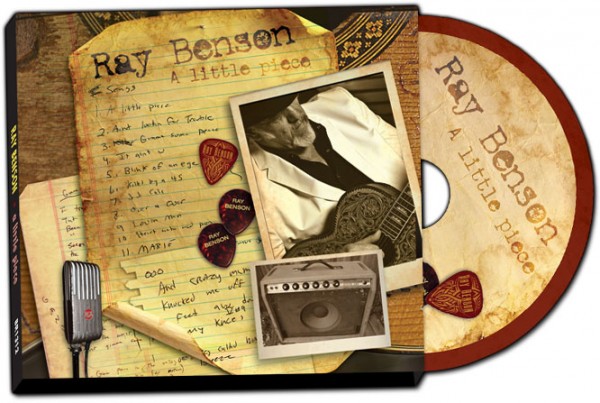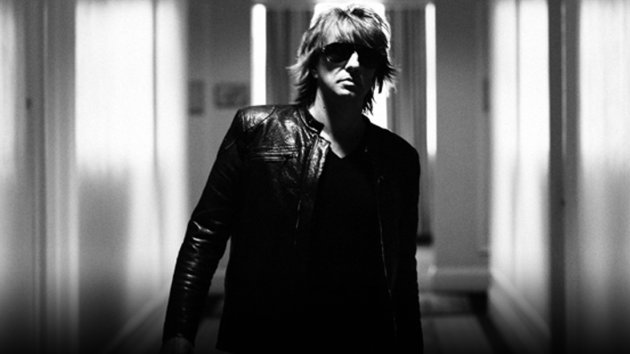Videos by American Songwriter
Patterson Hood, perhaps the primary conductor behind the runaway train that is southern rock outfit Drive -By Truckers, is again a solo artist. For the time being, that is. Following up on his excellent, previous solo records, 2004’s Killers and Stars and 2009’s Murdering Oscar (And Other Love Songs), the Alabama-bred, Athens, GA-based storyteller made great use of some non-Trucker time by gathering some close buddies to record his latest solo effort, Heat Lightning Rumbles in the Distance. We spoke with Hood about how this album was an unplanned surprise, his friend Vic Chesnutt’s legacy, and the band he would join if the opportunity arose.
There was a smaller gap between solo albums this time around. What was it about this album that made you get it out quicker?
This one just kind of happened. The songs just kind of came out. I didn’t set out to write a solo record at all, but I realized I had some songs and by the time I had nine or ten complete, I figured I had an album ready to record. When I listened to the demos on Garage Band, I just realized that it wasn’t a Truckers album. It was, and needed to be, a different type of record. The Truckers were still touring behind Go-Go Boots, and we had already planned on taking a hiatus this year, so this record felt like a calling to me personally. I felt a closeness and attachment to the songs as I recorded them pretty easily and quickly when I had time off during the Go-Go Boots tour.
Your father, musician David Hood, has been playing for a long time. Does he easily embrace new technologies such as Garage Band?
He’s always been good about embracing new technology – probably more than I have been in general, really. Technology, and the music business in general, has changed so much recently, that he’s grasping to keep up with everything just like we all are. He’s currently getting a lot of work, so that’s making him happy. When he’s happy, we’re all happy.
Solo-projects from artists who primarily perform in bands give the artist a unique chance to pick and choose friends they don’t typically work with. You seem to make a point of picking Centro-matic’s Will Johnson any chance you get.
I’ve always said that if I could be in another band on earth, and if they would have me, it would be Centro-matic. If I wasn’t in the Truckers, I would gladly jump on-board. I love those guys. I love the way they interact with each other and their work ethic. It was love at first listen for me. I knew Scott [Danbom – piano, fiddle] before I knew Will, just because he would come to Truckers shows anytime we would make it to Denton [Texas]. A big part of me wanting to make Murdering Oscar when I did was because I wanted to record with Scott and Will. I loved Scott’s piano playing, and I wanted their harmonies on a few of my songs. When I figured out what I was doing with this new record, those two were among the first I called, because I knew I wanted them involved somehow. Between those two, Kelly Hogan and my dad, I felt like I had a great group to bring to Athens and start recording.
Athens, Georgia certainly has a rich musical history. But it seems as though since the passing of Vic Chesnutt, it’s his name and influence that seems to pop up more often than anyone else’s from Athens. Do you see or feel that at all?
Absolutely. I think years from now, people will look back on this generation of musicians and bands and Vic’s stuff will be singled out. I really believe that. A future generation will discover him in a similar way that to how we’ve discovered Nick Drake. Drake’s music is so well-known now that it’s almost mainstream. I don’t know if Vic’s music will ever become mainstream, but it will be recognized as great literature. To me, he’s like Emily Dickinson, where he’ll be revered and people will study his work. I thought that even before he passed away.
When I first moved to Athens, people were constantly talking about Vic, and when I finally went to see him play, it was easy to see why he was thought of as the best writer in town. His loss was profound for Athens and for me, because he and I had become friends. It’s still a sad, sad thing and it’s still hard for me to believe he isn’t around, but his songs are, so that means he really is still around in that special way. The song on the new record that Kelly Hogan and I co-wrote, “Come Back Little Star” is about Vic. We all still miss him.
You were working on a relatively dark, semi-autobiographical book when this album took shape. How fresh and vivid are the memories from which you were drawing upon as you wrote?
Well, I know I can retrieve those darker memories and feelings, but I’m not sure I want to. That’s why they ended up in only a couple of songs on an album instead of becoming an entire book. For me, now isn’t the time that I want to be in that head-space for a long period of time. It’s like method-acting, really. I could definitely find the part of my brain where dark or troublesome memories live, but I just don’t want to spend so much time in that space right now. I have small kids and I don’t want to be that crazy. I did get some great songs from the original book concept, though, like “12:01” and “(untold pretties),” so that’s some good that came out of some things that weren’t so good. Those memories are still there if I ever want to go back and finish the book. The last thing I want to do is write an entire book and then have it suck.
Speaking of the song “(untold pretties),” you employ a spoken-word delivery instead of singing the lyrics. Given that you’ve only done that a couple of other times throughout your catalog, how did you decide on that delivery for this song?
I’ve always been drawn to that type of delivery, but it’s just not something I want to do too often. One song every four albums is probably enough. “18 Wheels of Love” was the first time I delved that deep into telling a story that way. The weird thing about “(untold pretties)” is that I’m not sure if the music or the lyrics came first. The lyrics are straight from the book I was working on. They’re little snapshots of memories that come together to tell a story.
About that same time, though, I wrote a piece of music that seemed to me like it would be something that played along with that story. I was going to put the music on the record as an instrumental, and then, just as we were finishing the tracking for the song, I decided to read the lyrics as the music played and it just fit perfect! It was the craziest thing. Everything with this record clicked in a free-flowing, imaginative way. Now, we’re having fun trying to see how we can make that song a great, entertaining live song.
That song, along with a few others on the new record, is sung from a first-person perspective. When writing those songs, was there any hesitation about opening yourself up in that way?
Not at all. I feel so strongly about what I’m saying that I’m not at all uncomfortable with exposing any of it. Maybe I should be a little less shameless, but I’m not. When it feels right, I don’t question it. Also, it helped that I made this record with people that I’m comfortable with and love very much. I love the challenge of turning this type of personal material into something entertaining for a live audience. I love the entertaining part of what I do. That’s part of the challenge, and I hope these songs can become moving experiences for everyone.












Leave a Reply
Only members can comment. Become a member. Already a member? Log in.